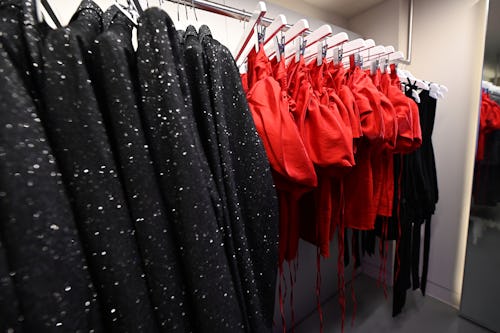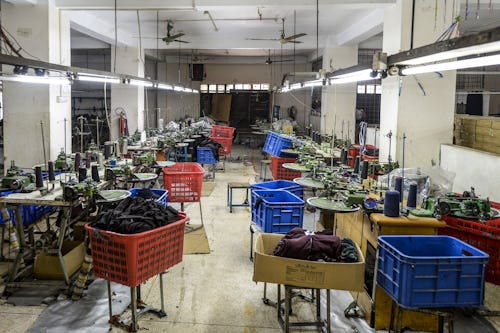
Excessive waste, child labor, stolen designs, and unsafe working conditions are nearly as publicized as fast fashion’s collaborations with celebrities like Meghan Fox, Cardi B, and Megan Thee Stallion.
The industry’s lack of regulations — or blatant disregard for existing ones — seems to be an open secret. Yet brands, and some shoppers, are willing to ignore the hefty environmental and ethical price tags that inevitably accompany such cheap clothing. And when the standard price of pants has dropped from $200 to $25 — many times, even lower — it’s all that much easier to turn a blind eye.
Revelations about the fashion industry have caused some people to shop more consciously, encouraging consumers to purchase goods from sustainable brands or buy less in general. But fast fashion caters to demographics that many retailers don’t: Industry giants Boohoo and Fashion Nova emerged from, and adapted to, fashion trends driven by social media, pulling in most of their profit from online sales and influencer collaborations.
Responsibility is scarce in the fast fashion industry, and new legislation in the U.S. is hoping to change that.
The Instagram and TikTok-obsessed demographic each brand caters to often prioritizes fitting in with fast-paced trends — and doing so affordably — over ethical dilemmas. Others, like low-income and plus-sized shoppers, turn to fast fashion as one of the few choices available for cheap, trendy clothing. But when brands make such an effort to hide their means of production — twisting the truth, or omitting it entirely — it’s the companies that should be held accountable, not the consumers. Responsibility is scarce in the fast fashion industry, and new legislation in the U.S. is hoping to change that.
With great power

Just last month, a New York coalition of senators, sustainability nonprofits, and designers proposed the Fashion Sustainability and Social Accountability Act (otherwise known as the Fashion Act), which aims to hold all major brands accountable for their environmental and social impacts. The bill would require all fashion companies that sell their products in New York and generate more than $100 million in revenues to map out at least 50 percent of their supply chains and disclose impacts such as greenhouse gas emissions, water footprint, and chemical use. High fashion companies like LVMH and Prada would have to publish their business practices right alongside fast fashion giants such as Fashion Nova and Boohoo.
Should the Fashion Act pass through New York legislature, brands would have to report the total volume of materials they produce; an innovative move directed at eliminating misinformation. Fashion companies, regardless of status, often boast about reducing the impact of their materials all while still increasing their production and their total footprint along with it. With the Fashion Act, brands would be required to reduce their impacts by setting (and meeting) Science Based Targets for their greenhouse gas emissions.
As of now, fast fashion companies have only disclosed their wages unwillingly, mostly as a result of investigations or exposés.
To regulate labor mistreatment — a problem especially rife within the fast fashion industry — the bill asks that brands disclose the average wages of its workers, as well as what measures are in place to ensure responsible business conduct in management. As of now, fast fashion companies have only disclosed their wages unwillingly, most as a result of investigations or exposés. In 2019, a FTC investigation found that Fashion Nova underpaid Los Angeles factory workers, who were making as little as $2.77 per hour. The brand paid $3.8 million in back wages to hundreds of workers and promptly shifted most of its production abroad.
Similarly, the New York Times reported in 2020 that Boohoo paid its workers $4.40 an hour, despite the $10.93 mandated as national living wage in Britain. The retailer said it was “shocked and appalled” at the allegations, stating its intent to invest $12.5 million in “eradicating malpractices.” Over a year later, a U.K. news source reported that Boohoo still paid its factory workers below minimum wage, and the brand stated it had “not seen evidence” that its workers were underpaid.

If the Fashion Act is passed, companies will have a year to map out their suppliers and producers, with 18 months to form their environmental impact plans. All of this would have to be posted publicly on a given brand’s website for more transparency than ever before. Any companies in violation of the law could face fines equivalent to 2 percent of their annual profits — which, for companies like Fashion Nova, could be up to $10 million. All fines would be put in a community reserve that would fund environmental justice projects in New York.
The Fashion Act is one of many efforts to bring more regulation to the fashion industry, but it may be the most in-depth. Issues such as production volumes, climate targets, and work’s wages are often overlooked. While progressive, fines haven’t held fast fashion companies before, and it’s possible that brands are willing to pay a large fee to continue selling products for prices as cheap as 11 cents. The more companies slash their pricing, the greater the demand is from the public, and subsequently, the fast fashion industry continues to grow. Even with regulation, consumers are the ones deciding what they’re buying and where their purchases come from — choices that ultimately make the biggest impact.
The fine print

In January, Fashion Nova was accused of purposefully blocking negative product reviews on its website, allegedly suppressing reviews with ratings lower than four stars out of five. The Federal Trade Commission (FTC) ordered the company to pay $4.2 million to settle the allegations — which it did, seemingly with ease. In 2020, the brand paid the FTC $9.3 million to settle allegations that Fashion Nova failed to ship orders in a timely fashion and illegally issued gift cards in place of refunding its customers.
With money to spare — likely accumulated from cheap production costs — it’s clear that fines aren’t deterring fast fashion companies from continuing their unethical practices. While serial non-compliance with the Fashion Act could result in a number of large fines, that very aspect could encourage brands to misreport their practices — previous instances have demonstrated that fast fashion companies are not above lying to make a profit.
Influencer and editorial marketing, which continues to replace traditional advertising, makes deception all the more simple. The promotional strategy lends a more “organic” feel to marketing — especially so if companies omit the fact that the posts were paid advertisements. In 2016, department store chain Lord & Taylor did just that, failing to disclose that an article in Nylon and 50 influencer Instagram posts were paid endorsements. The company agreed to settle FTC charges for customer deception, but that was after millions of people had viewed (and been influenced by) the seemingly objective content.
Even with the transparency the Fashion Act requires, there’s a question of whether it will result in significant change, or whether companies will simply report more publicly on problems that continue to go unsolved. The bill must be strengthened in order for accountability to be held, but at the very least it’s a step in the right direction, and as of now, there are no regulations to compare it to.
The Fashion Act won’t be put to a vote until the spring, but the bill has already garnered support from big environmental nonprofits like the National Resources Defense Council and fashion designers like Stella McCartney. At its core, the Fashion Act will shine a light on what the fashion space, and in particular, the fast fashion industry, is hiding from its shoppers. If consumers don’t care — or aren’t aware — of the reality behind fast fashion, change won’t be able to happen.







